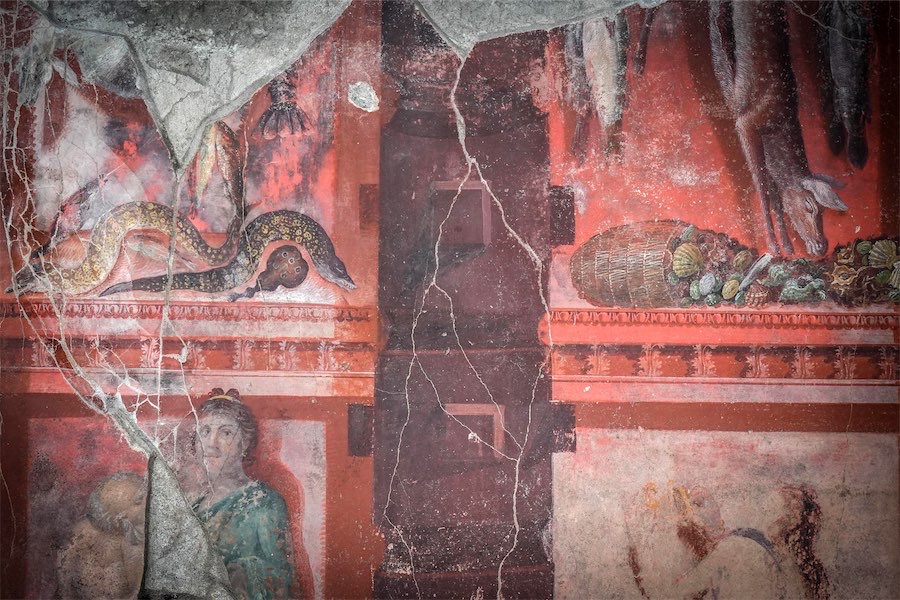
By Crispian Balmer in Rome
Archaeologists in Pompeii have uncovered rare, nearly life-sized frescoes that offer fresh insight into religious practices in the ancient city before it was destroyed by Mount Vesuvius in AD 79.
The discovery features a large-scale frieze that spans three walls of a banquet hall, presenting vivid imagery of the initiation rites for followers of Dionysus – the ancient Greek god of wine, fertility, theatre and religious ecstasy.
The initiation rituals, known as the Mysteries of Dionysus, were secretive religious rites dedicated to the god, promising spiritual enlightenment and possibly a blessed afterlife.
The fresco, dating to 40-30 BC, presents vivid imagery of Dionysian followers in states of ritualistic ecstasy, dancing and hunting, resembling the frescoes of the nearby Villa of the Mysteries, which were uncovered 100 years ago.
“In 100 years’ time, today will be remembered as historic because the discovery we are presenting is historic,” said Italian Culture Minister Alessandro Giuli, who attended the unveiling of the frescoes on Wednesday.
“Alongside the Villa of the Mysteries, this fresco forms an unparalleled testament to the lesser-known aspects of ancient Mediterranean life.”
The giant frieze illustrates the female followers of Dionysus as both dancers and fierce hunters, carrying a slaughtered goat on their shoulders or holding a sword and the entrails of an animal in their hands.
At the centre, is a fresco of an elegantly dressed woman who is possibly waiting to be initiated into the mysteries.
An upper frieze depicts live and sacrificed animals, including a fawn, a freshly gutted boar, roosters, and fish. Researchers said this juxtaposition underscored the dual nature of Dionysian worship, combining revelry with primal sacrifice.
“The question is, what do you want to be in life, the hunter or the prey?” said the director of Pompeii, Gabriel Zuchtriegel.
The once-thriving city of Pompeii and the surrounding countryside in southern Italy were submerged by ash when Mount Vesuvius exploded, killing thousands of Romans who had no idea they were living alongside one of Europe’s biggest volcanoes.
The archaeological site covers approximately 66 hectares, with about 44 hectares fully excavated. The latest dig is in an area known as Regio IX which began in early 2023 and has so far revealed more than 50 rooms.
Some of the recent discoveries include a black salon depicting scenes from the Trojan War, an extensive bath complex and a fresco that depicts what might be an ancestor of the Italian pizza.
Who can be trusted?
In a world of spin and confusion, there’s never been a more important time to support independent journalism in Canberra.
If you trust our work online and want to enforce the power of independent voices, I invite you to make a small contribution.
Every dollar of support is invested back into our journalism to help keep citynews.com.au strong and free.
Thank you,
Ian Meikle, editor









Leave a Reply